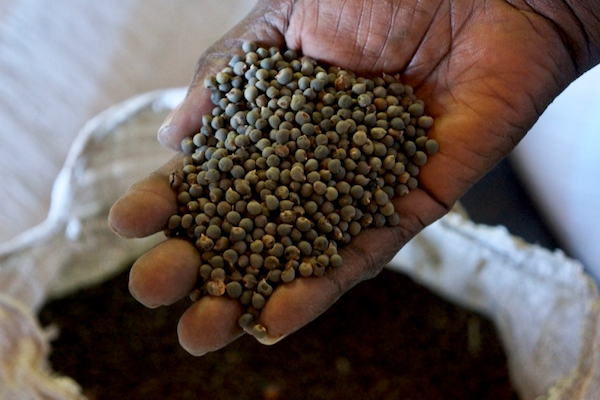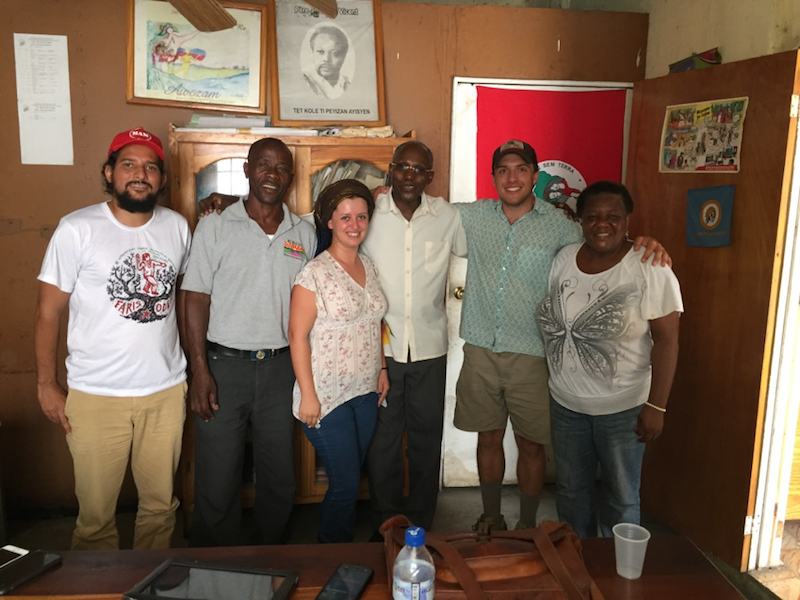
May 2017
In early October 2016, Haiti was devastated by Hurricane Matthew which destroyed nearly 80% of the Haitian seed supply. MPP (Peasant Movement of Papaye or Mouvement Peyisan Papay in Haitian Creole) is the oldest, largest and among the most impactful local peasant movements in Haiti. Following Hurricane Matthew, MPP put out a call for seed support and OAEC responded by raising money for MPP to purchase nearly 4 tons of organic, open-pollinated seeds from Haitian peasant farmers in less affected regions of the country.
Pictured here is an important bean variety on the island called Pwa Kongo (or Congo Bean), likely brought over to Haiti by enslaved Africans hundreds of years ago. photo by Cooper Freeman

This is one of the bean varieties purchased with OAEC donations. This particular variety is called Pwa Kongo (or Congo Bean), likely brought over to Haiti by enslaved Africans hundreds of years ago.
In early October 2016, the Category 4 Hurricane Matthew devastated Haiti. With maximum sustained winds of up to 150mph, Matthew was the strongest storm to hit Haiti since Hurricane Cleo in 1964, and the third strongest on record. Matthew destroyed the entire agricultural production in six out of ten departments (government regions) of the country. For peasant farmers in Haiti who make up nearly 50% of the Haitian population, Matthew created a direct threat to their seed and food sovereignty and their survival.
Through the international peasant movement, La Via Campesina, OAEC’s Program Manager Cooper Freeman connected with the largest and oldest peasant agriculture movement in Haiti, the Peasant Movement of Papaye (MPP – Mouvement Peyisan Papaye), who put out a call for seed support directly following Hurricane Matthew. MPP stated that,
“After the phase of extreme emergency with its need for food, drinking water, clothes, drugs, provisory accommodation, farming families will have to start agricultural production again, though the soils are totally eroded. …The most urgent seeds are the beans, maize and vegetable seeds, because we rapidly have to produce food. As everything was carried away by the water in the areas touched by cyclone Matthew, we absolutely need to distribute seeds.”
Especially worrisome was the intervention of major seed corporations, in particular Monsanto that in 2010 following the major earthquake donated 475 tons of toxic-coated, hybrid seed to Haitian peasants, undermining their ability to farm organically and freely save seeds in future years. MPP put over 10,000 people in the streets to protest the donation and publicly burned their allocation of the Monsanto seeds.
Pictured above: One of ten demonstration eco-villages MPP built after the earthquake in 2010 for displaced peoples. Each village features ten homes with composting toilets, diverse food forests, roof-water capture systems, solar electricity, and collective governance. These villages stand in stark contrast to the government housing offered to displaced peoples following the earthquake, which provide no opportunity for self-sufficiency and a dignified home. photo by Cooper Freeman
For over 40 years, MPP has fought and organized for Haitian food & seed sovereignty, forest protection, regionally-appropriate economic development, and individual survival, and offered extensive education for peasant farmers all over the country in agro-ecology, land restoration, and technical services. To learn more about MPP’s work or to make a donation, visit their website at mpphaiti.org.
Through the generous support of OAEC donors, OAEC raised enough money to donate roughly four tons of seeds to MPP following Hurricane Matthew. With this donation, MPP bought seeds from peasant farmers in less affected regions of Haiti and distributed free seed to peasant farmers in the most affected regions of the country. Additionally, MPP owns and operates a public radio station and following the Hurricane, MPP put out a call for donations from peasants who could spare extra seeds. Peasant farmers donated another roughly four tons of seeds to match OAEC’s donation. All of the seeds donated and distributed were open-pollinated, organic, diverse, and culturally-appropriate mixes of locally-adapted varieties of maize, beans, and vegetables, and were purchased at a fair price directly from farmers in Haiti.
In May 2017, Cooper Freeman, OAEC’s Program Manager, traveled to Haiti to meet with MPP at their invitation, spending a couple days visiting their headquarters, training center and demonstration projects, learning about their movement and programs, following-up on the seed donation, and discussing potential future collaborations towards Haitian seed sovereignty. The MPP center has many similarities to OAEC, focusing on popular education and resilient design, with specific areas of expertise around ecological agriculture, forest conservation, decentralized water systems, seed saving, and a social justice and anti-globalization political program, among others.
Cooper met with the four largest peasant organizations in Haiti (who call themselves “Kat Zye Kontre,” meaning Four Focused Eyes), while in the capital city of Port-au-Prince to learn about their current initiatives and priorities towards Haitian peasant seed sovereignty. The four organizations include Tet Kole, National Peasant Movement of the Papay Congress (MPNKP), MPP, and the Regional Coordination of the Organizations of the South-East (KROS). Additionally, the meeting was attended by members of Brazil’s Landless Workers Movement (MST).







